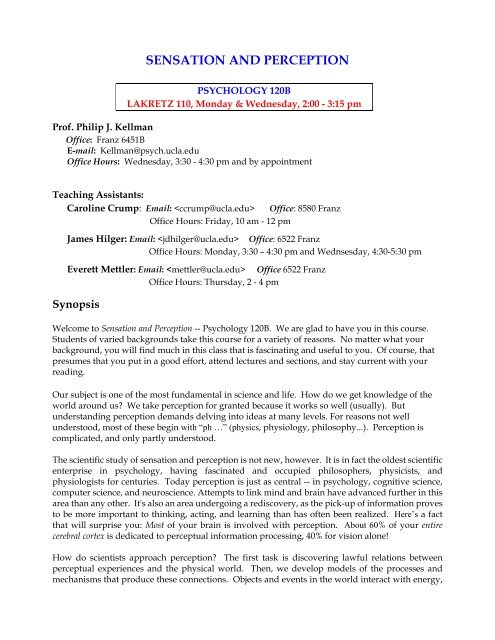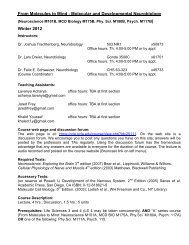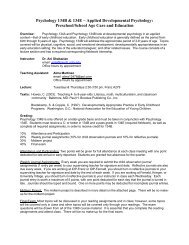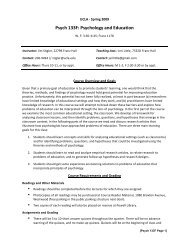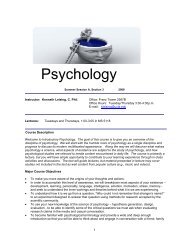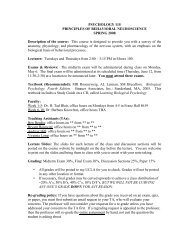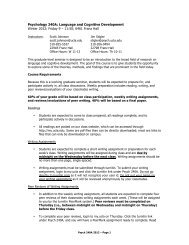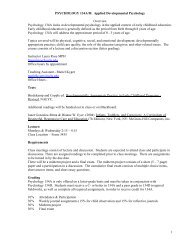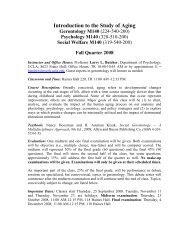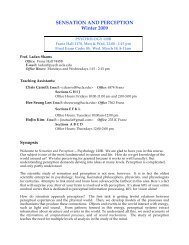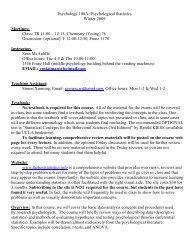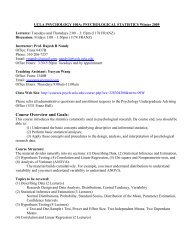sensation and perception - Courses in Psychology - UCLA
sensation and perception - Courses in Psychology - UCLA
sensation and perception - Courses in Psychology - UCLA
You also want an ePaper? Increase the reach of your titles
YUMPU automatically turns print PDFs into web optimized ePapers that Google loves.
SENSATION AND PERCEPTIONPSYCHOLOGY 120BLAKRETZ 110, Monday & Wednesday, 2:00 - 3:15 pmProf. Philip J. KellmanOffice: Franz 6451BE-mail: Kellman@psych.ucla.eduOffice Hours: Wednesday, 3:30 - 4:30 pm <strong>and</strong> by appo<strong>in</strong>tmentTeach<strong>in</strong>g Assistants:Carol<strong>in</strong>e Crump: Email: Office: 8580 FranzOffice Hours: Friday, 10 am - 12 pmJames Hilger: Email: Office: 6522 FranzOffice Hours: Monday, 3:30 – 4:30 pm <strong>and</strong> Wednsesday, 4:30-5:30 pmEverett Mettler: Email: Office 6522 FranzOffice Hours: Thursday, 2 - 4 pmSynopsisWelcome to Sensation <strong>and</strong> Perception -- <strong>Psychology</strong> 120B. We are glad to have you <strong>in</strong> this course.Students of varied backgrounds take this course for a variety of reasons. No matter what yourbackground, you will f<strong>in</strong>d much <strong>in</strong> this class that is fasc<strong>in</strong>at<strong>in</strong>g <strong>and</strong> useful to you. Of course, thatpresumes that you put <strong>in</strong> a good effort, attend lectures <strong>and</strong> sections, <strong>and</strong> stay current with yourread<strong>in</strong>g.Our subject is one of the most fundamental <strong>in</strong> science <strong>and</strong> life. How do we get knowledge of theworld around us? We take <strong>perception</strong> for granted because it works so well (usually). Butunderst<strong>and</strong><strong>in</strong>g <strong>perception</strong> dem<strong>and</strong>s delv<strong>in</strong>g <strong>in</strong>to ideas at many levels. For reasons not wellunderstood, most of these beg<strong>in</strong> with “ph …” (physics, physiology, philosophy...). Perception iscomplicated, <strong>and</strong> only partly understood.The scientific study of <strong>sensation</strong> <strong>and</strong> <strong>perception</strong> is not new, however. It is <strong>in</strong> fact the oldest scientificenterprise <strong>in</strong> psychology, hav<strong>in</strong>g fasc<strong>in</strong>ated <strong>and</strong> occupied philosophers, physicists, <strong>and</strong>physiologists for centuries. Today <strong>perception</strong> is just as central -- <strong>in</strong> psychology, cognitive science,computer science, <strong>and</strong> neuroscience. Attempts to l<strong>in</strong>k m<strong>in</strong>d <strong>and</strong> bra<strong>in</strong> have advanced further <strong>in</strong> thisarea than any other. It's also an area undergo<strong>in</strong>g a rediscovery, as the pick-up of <strong>in</strong>formation provesto be more important to th<strong>in</strong>k<strong>in</strong>g, act<strong>in</strong>g, <strong>and</strong> learn<strong>in</strong>g than has often been realized. Here’s a factthat will surprise you: Most of your bra<strong>in</strong> is <strong>in</strong>volved with <strong>perception</strong>. About 60% of your entirecerebral cortex is dedicated to perceptual <strong>in</strong>formation process<strong>in</strong>g, 40% for vision alone!How do scientists approach <strong>perception</strong>? The first task is discover<strong>in</strong>g lawful relations betweenperceptual experiences <strong>and</strong> the physical world. Then, we develop models of the processes <strong>and</strong>mechanisms that produce these connections. Objects <strong>and</strong> events <strong>in</strong> the world <strong>in</strong>teract with energy,
<strong>Psychology</strong> 120B Sensation & Perception 2such as light <strong>and</strong> sound. From patterns formed <strong>in</strong> this energy, perceptual systems extract<strong>in</strong>formation about structure <strong>and</strong> events <strong>in</strong> the world. To underst<strong>and</strong> all this, we need accounts of the<strong>in</strong>formation, of computational processes, <strong>and</strong> of neural mechanisms. The study of <strong>perception</strong> teaches theneed for multiple levels of analysis <strong>in</strong> the study of the m<strong>in</strong>d.Study<strong>in</strong>g <strong>perception</strong> also raises the deepest issues about the nature of reality, m<strong>in</strong>d, <strong>and</strong> knowledge.What is real? Is <strong>perception</strong> a direct l<strong>in</strong>k to reality? We are all familiar with illusions or failures of<strong>perception</strong>. Yet, if we know reality through <strong>perception</strong>, what does it mean to perceive <strong>in</strong>correctly?The consequences for science are as large as for the <strong>in</strong>dividual. In all of its branches, scientificknowledge depends on observation; as such it requires a coherent account of how we obta<strong>in</strong>knowledge by perceiv<strong>in</strong>g.The stakes are high -- <strong>in</strong>tellectually, but also practically. Analyz<strong>in</strong>g <strong>perception</strong> allows us tocommunicate <strong>and</strong> to depict; to imag<strong>in</strong>e <strong>and</strong> to build artificial systems, such as virtual realitysystems. Investigat<strong>in</strong>g the neural hardware of <strong>perception</strong> helps us to underst<strong>and</strong> <strong>and</strong> treat <strong>in</strong>jury<strong>and</strong> disorder. Perception issues arise <strong>in</strong> many facets of life, such as <strong>in</strong> the design of aircraft displays<strong>and</strong> controls, highways, motion pictures, <strong>and</strong> Ipods, to name only a few.Although a 10-week, first course <strong>in</strong> <strong>perception</strong> is necessarily limited <strong>in</strong> the scope, you are <strong>in</strong>vited toexplore issues <strong>in</strong> doma<strong>in</strong>s with<strong>in</strong> <strong>and</strong> beyond our course material with the <strong>in</strong>structor <strong>and</strong> TAs <strong>and</strong>especially on the course website. Your <strong>in</strong>structor has been do<strong>in</strong>g scientific research <strong>in</strong> <strong>perception</strong>for a long time, <strong>and</strong> has also been <strong>in</strong>volved <strong>in</strong> a wide range of applications, <strong>in</strong>clud<strong>in</strong>g aviation <strong>and</strong>air traffic control, vehicle accident cases (as an expert witness, not a participant), consultant togovernment <strong>and</strong> law enforcement agencies, <strong>and</strong> development of educational technology.Discussions with your <strong>in</strong>structor, TAs, <strong>and</strong> on the course website can help you to relate thecoursework to your <strong>in</strong>terests <strong>and</strong> to exp<strong>and</strong> your <strong>in</strong>volvement <strong>in</strong> the study of <strong>perception</strong>.Our course will emphasize visual <strong>perception</strong>, both our most important sense <strong>and</strong> the one moststudied. We will also discuss auditory <strong>perception</strong> <strong>and</strong> issues that span all perceptual systems.Course Prerequisites <strong>and</strong> Related Information<strong>Psychology</strong> 120B fulfills a core course requirement for the <strong>Psychology</strong> <strong>and</strong> related majors.Prerequisites <strong>in</strong>clude prior fulfillment of <strong>Psychology</strong> 10 <strong>and</strong> <strong>Psychology</strong> 100A.Because this course has been designated as an "impacted" course, the Department of <strong>Psychology</strong> hasrequested that the follow<strong>in</strong>g <strong>in</strong>formation be <strong>in</strong>cluded here:1) If you are not enrolled <strong>in</strong> a discussion section by the end of the second week of the quarter, youwill be dropped by the computer. Furthermore, CORE courses are over-enrolled to compensate forthe typical drop rate. For this reason, Permission to Enroll Authorization Numbers (PTE's)will not be issued for this course. Students with concerns should go to the <strong>Psychology</strong>Advis<strong>in</strong>g Office, 1531 Franz Hall. All enrollment issues must be h<strong>and</strong>led by the Advis<strong>in</strong>g Office.2) You cannot drop an impacted course after the second week of a term for other than exceptionallyextenuat<strong>in</strong>g circumstances which must be approved by the L&S Executive Committee on referral bycollege counsel<strong>in</strong>g units. Exceptionally extenuat<strong>in</strong>g circumstances do not <strong>in</strong>clude circumstances ofshort duration where other alternatives exist, <strong>in</strong>clud<strong>in</strong>g but not limited to a late drop of other(nonimpacted) courses or tak<strong>in</strong>g an Incomplete <strong>in</strong> the impacted course.
<strong>Psychology</strong> 120B Sensation & Perception 3Required Read<strong>in</strong>gsTextbook: Wolfe, J.M. et al (2006). Sensation & Perception. First Edition. Sunderl<strong>and</strong>, MA:S<strong>in</strong>auer Associates, Inc. (Abbreviated as “T” for textbook <strong>in</strong> read<strong>in</strong>g assignments.)Resource Website: Our m<strong>in</strong>ilabs, a study guide, <strong>and</strong> study questions can be found at:http://www.s<strong>in</strong>auer.com/wolfe. This is a great resource for the class. It demonstratessome key sensory <strong>and</strong> perceptual phenomena <strong>and</strong> allows you to perform somem<strong>in</strong>i-experiments. We will use selected assignments as m<strong>in</strong>i-labs to give you firsth<strong>and</strong>experience with some of the phenomena <strong>and</strong> concepts <strong>in</strong> the course. This website isabbreviated “RW” on course assignments. Some materials there, such as short essays onspecial topics, are valuable supplements to the course even though they may not beassigned. If you regularly go through the study guide <strong>and</strong> study questions week by week, itwill help your learn<strong>in</strong>g <strong>and</strong> your exam performance.Course Web PageThe address for the psychology course web pages is ; fromhere, click on <strong>Psychology</strong> 120B to access the web page for this course. Our current <strong>in</strong>formation isthat your log<strong>in</strong> should be your Bru<strong>in</strong> OnL<strong>in</strong>e (BOL) ID number <strong>and</strong> your password should be your9-digit student ID number.A variety of resources will be available on the course web page. We will post some graphics used <strong>in</strong>lectures, <strong>in</strong>formation about review sessions <strong>and</strong> paper deadl<strong>in</strong>es, <strong>and</strong> review questions.Accompany<strong>in</strong>g our post<strong>in</strong>gs will be a class bullet<strong>in</strong> board. Here you may post questions orresponses to questions of others. Your <strong>in</strong>structor <strong>and</strong> TAs will jo<strong>in</strong> <strong>in</strong> discussions as they unfold onthe bullet<strong>in</strong> board. We encourage you to use this resource, as it is not only a useful learn<strong>in</strong>g tool, butit can help you become more comfortable <strong>and</strong> personally <strong>in</strong>volved with the course material.We recommend that you check the class website often for the announcements, <strong>in</strong>formation, <strong>and</strong>resources to be found there.Discussion Sections (will start the week of Oct. 6)Discussion sections will be a valuable part of the course. Although attendance will not be formallytaken, your consistent participation is strongly encouraged. Sections are for your benefit, you’reyour active participation will strongly benefit your learn<strong>in</strong>g <strong>and</strong> your success on exams. Sectionsenable you to focus on key po<strong>in</strong>ts from the lectures <strong>and</strong> read<strong>in</strong>gs <strong>in</strong> an <strong>in</strong>teractive format. If you arenot already enrolled <strong>in</strong> a discussion section, it is important to get this worked out <strong>in</strong> the first week ofthe class – if you have a schedule conflict, please try to switch with another student by post<strong>in</strong>g onthe class website (please do not send an email to everybody <strong>in</strong> the class!).Course RequirementsExams: There will be 2 exams, one on the first half (Oct. 29) <strong>and</strong> one on the second half (Dec. 3) ofthe course. Each exam will cover only the material <strong>in</strong> that half of the course, but they will cover thematerial <strong>in</strong> both the lecture <strong>and</strong> the read<strong>in</strong>gs. Each exam will have 50 multiple-choice questions.Due to staff<strong>in</strong>g limitations, there will be NO make-up exam<strong>in</strong>ations given <strong>in</strong> this course.
<strong>Psychology</strong> 120B Sensation & Perception 4M<strong>in</strong>i-Labs: Each week you will be required to review some units on the RW. For each unit, youmust write (<strong>in</strong> typ<strong>in</strong>g) <strong>and</strong> turn <strong>in</strong> a brief description of the ma<strong>in</strong> po<strong>in</strong>ts <strong>in</strong> that unit. The length willvary across units as some conta<strong>in</strong> more <strong>in</strong>formation than others. Do not get carried away! Usuallyan activity will consist of brief <strong>in</strong>formation <strong>and</strong> an <strong>in</strong>teractive activity. A one-sentence comment foreach activity should suffice: Indicate what you learned from it, or what it demonstrated. The ma<strong>in</strong>purpose for your writ<strong>in</strong>g these brief descriptions is to verify that you have reviewed <strong>and</strong> made aneffort to underst<strong>and</strong> the material. The labs will give you excellent support <strong>in</strong> absorb<strong>in</strong>g importantconcepts <strong>and</strong> to give you some chance to experience firsth<strong>and</strong> some of the fasc<strong>in</strong>at<strong>in</strong>g phenomena <strong>in</strong><strong>perception</strong>.M<strong>in</strong>i-labs listed for the class meet<strong>in</strong>gs <strong>in</strong> a given week (Tues <strong>and</strong> Thurs) are due <strong>in</strong> the follow<strong>in</strong>gweek on Tues, before the class. Late m<strong>in</strong>i-labs will be penalized 10% of the perfect grade per 24hours.Research Paper: Textbooks are convenient but sanitized vehicles for learn<strong>in</strong>g. Real knowledge <strong>in</strong>a scientific field is conta<strong>in</strong>ed primarily <strong>in</strong> journal articles, published <strong>in</strong> peer-reviewed journals. Toget you acqua<strong>in</strong>ted with this primary form, the course requires one research paper, 4 pages long.You will select <strong>and</strong> read a designated journal article. Your paper will summarize what themotivat<strong>in</strong>g questions were, what was done <strong>and</strong> what was found. You will then comment onstrengths <strong>and</strong> weaknesses of the research, <strong>and</strong> make suggestions for future research. More detailed<strong>in</strong>structions will be posted on the class website. It will be due on Nov. 12.Grad<strong>in</strong>g: The two exams will count for 70% of your grade. M<strong>in</strong>i-lab reports <strong>and</strong> the ResearchPaper will each count 15%.Extra Credits: There will be three optional extra credit po<strong>in</strong>ts available, awarded for participation <strong>in</strong>an experiment through the <strong>UCLA</strong> <strong>Psychology</strong> subject pool. The f<strong>in</strong>al grades will be based on acurve, with extra-credit po<strong>in</strong>ts awarded after the grade distribution has been determ<strong>in</strong>ed (<strong>in</strong> otherwords, they really are extra).The post<strong>in</strong>g <strong>and</strong> schedul<strong>in</strong>g of experiments is h<strong>and</strong>led via Sona, an onl<strong>in</strong>e experiment participationorganizer. To access Sona, go to http://ucla.sona-systems.com/. Be sure to follow the detailed<strong>in</strong>formation on how to use this system.Policy on Incompletes: To receive an <strong>in</strong>complete, you must have completed more than half thecourse with pass<strong>in</strong>g grades. Thus, if you miss both exams, or miss one exam <strong>and</strong> also lack a sectiongrade, you may not take an Incomplete. Be sure to check with the Undergraduate Advis<strong>in</strong>g Office ifyou are plann<strong>in</strong>g to take an Incomplete.Topics <strong>and</strong> Read<strong>in</strong>g AssignmentsMost read<strong>in</strong>gs are taken from your textbook, abbreviated "T" below (for the first author, Wolfe).M<strong>in</strong>i-labs can be found at: http://www.s<strong>in</strong>auer.com/wolfe
<strong>Psychology</strong> 120B Sensation & Perception 5Date Topic Read<strong>in</strong>gsSept 29Oct 1Class Bus<strong>in</strong>essIntroduction to Sensation <strong>and</strong> Perception;Levels of Analysis <strong>in</strong> PerceptionT, Ch.1, 2-25http://www.nici.kun.nl/~peterh/doc/marr_levels.htmlRW, Ch.1: Activities 1.2,1.3Optional:http://www.iep.utm.edu/e/epis-per.htm#H1http://www.marxists.org./reference/subject/philosophy/works/ge/helmholt.htmhttp://plato.stanford.edu/entries/<strong>perception</strong>-episprob/Oct 6 Psychophysics <strong>and</strong> Signal Detection Theory Reread: T, Ch. 1, pp. 9-17; Ch. 2, pp.35-40RW, Ch. 1: Activity 1.1Ch. 2: Activities 2.1-2.3Oct 8Oct 13The Visual System:Anatomy <strong>and</strong> PhysiologyThe Visual System:Anatomy <strong>and</strong> PhysiologyT, Ch. 2, pp. 26-45RW, Ch. 2: Activities 2.4-2.6T, Ch. 3, pp. 46-72RW, Ch. 3: Activities 3.1-3.3Oct 15 See<strong>in</strong>g Contrast <strong>and</strong> Edges T, Ch. 2, pp. 64 – 73;Oct 20 See<strong>in</strong>g Lightness <strong>and</strong> Brightness /Theories of Perception applied toLightnessT, pp. pp. 115-121http://encarta.msn.com/text_761571997___15/Perception_(psychology).htmlhttp://persci.mit.edu/people/adelson/publications/gazzan.dir/gazzan.htm [Background]Oct 22 See<strong>in</strong>g Color T, Ch. 5, pp. 98-108RW, Ch. 5: Activities 5.3-5.5Oct 27See<strong>in</strong>g Color (cont’d)Catch up <strong>and</strong> ReviewT, Ch. 5, pp. 108-115; 121-125RW, Ch. 5: Activities 5.1-5.2Oct 29 *** FIRST EXAM ***
<strong>Psychology</strong> 120B Sensation & Perception 6Nov 3 Object Perception T, Ch. 4, pp. 74-88RW, Activities 4.1-4.3Nov 5 Object Perception (cont.) T, Ch. 4, pp. 88-97; Ch. 8, pp. 176-186RW, Activities 4.4-4.6Nov 10 Perceiv<strong>in</strong>g Depth <strong>and</strong> Size T, Ch. 6, pp. 126-138RW, Activities 6.1, 6.2; essay 6.1Nov 12Perceiv<strong>in</strong>g Depth <strong>and</strong> Size (cont.)***RESEARCH PAPER DUE***T, Ch. 6, pp. 138-153RW, Ch. 6.3, 6.4; essay 6.3Nov 17 Motion <strong>and</strong> Event Perception T, Ch. 7, pp. 154-165RW, Activities 7.1, 7.4; 7.2 optionalNov 19 Motion <strong>and</strong> Event Perception (cont.) T, Ch. 7, pp. 165-174RW, Activities 7.2, 7.3; essay 7.2Nov 24 The Auditory System T, Ch. 9, pp. 204-233RW, Activities 9.1-9.4Nov 26 Auditory Space Perception T, Ch. 10, pp. 234-259RW, Activities 10.1; 10.3-10.5Dec 1 Perceptual Learn<strong>in</strong>g <strong>and</strong> Development No additional read<strong>in</strong>g.Dec 3 *** SECOND EXAM ***


